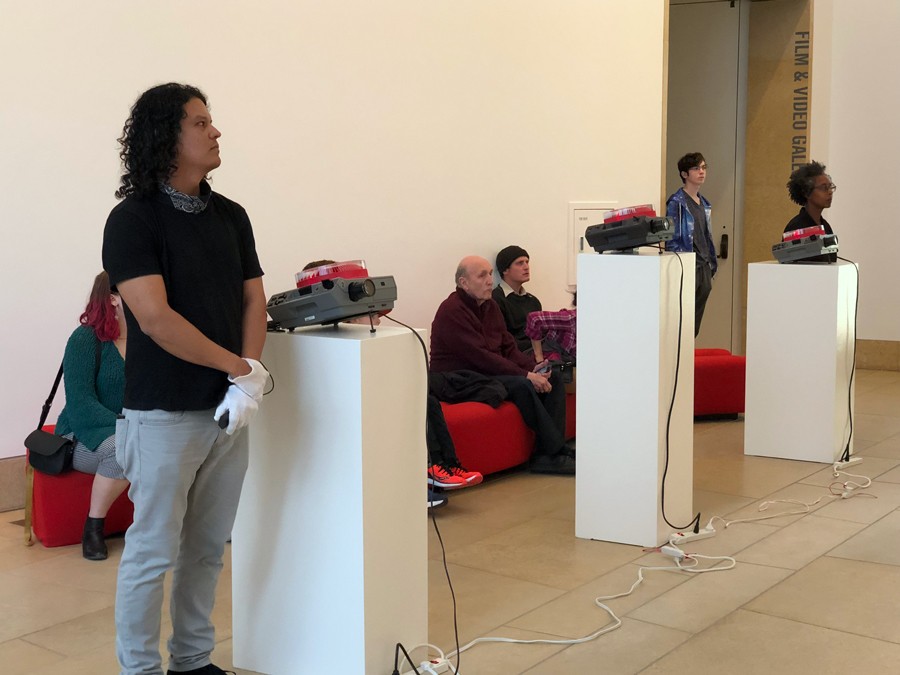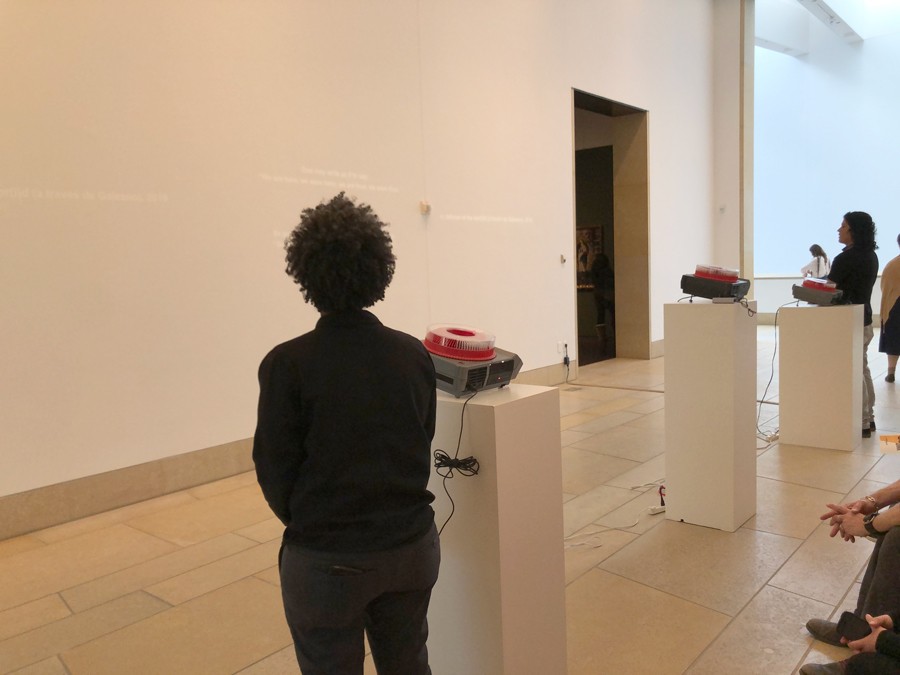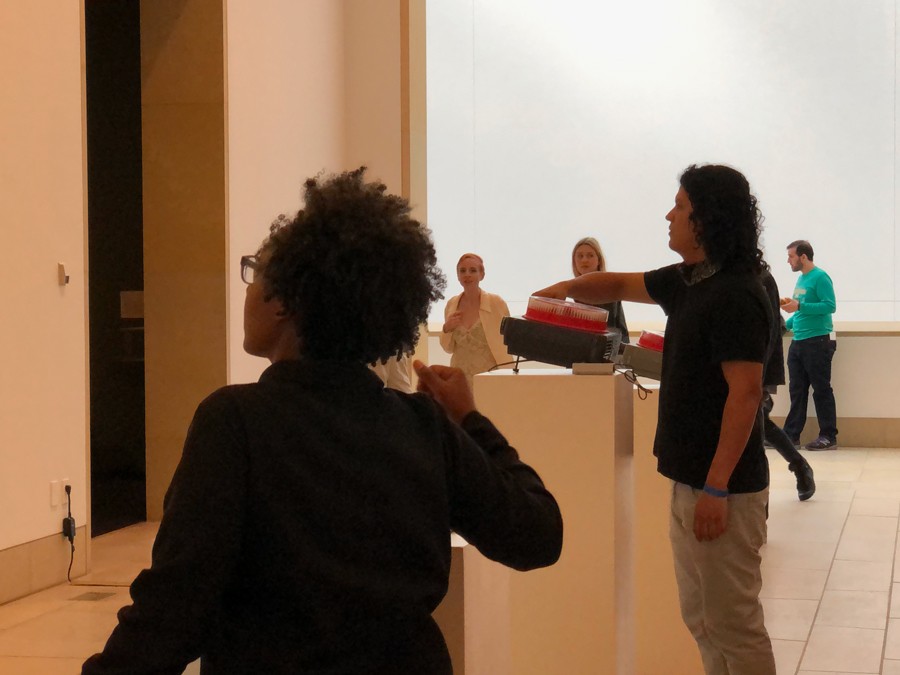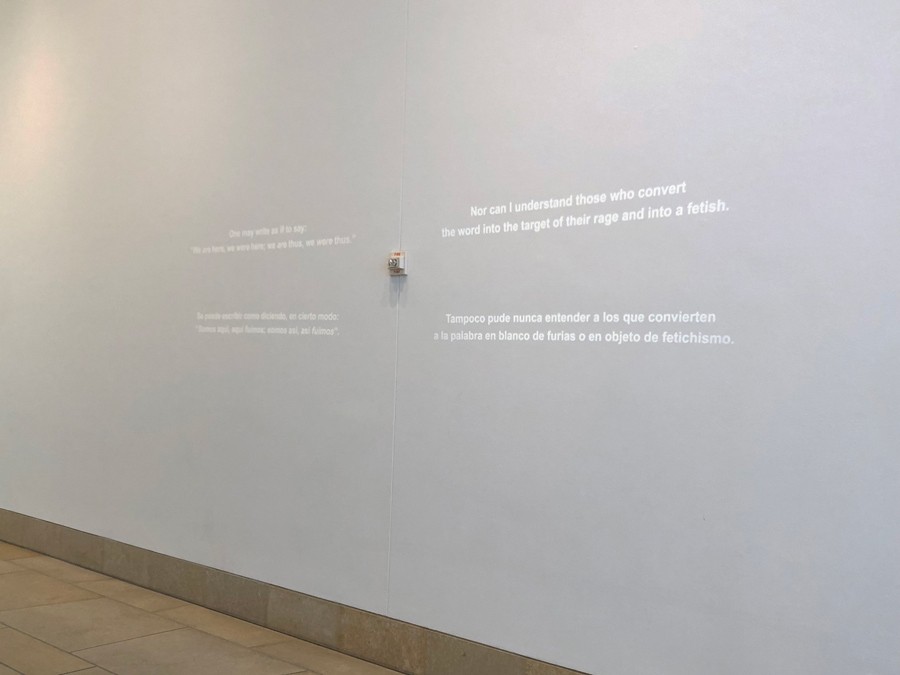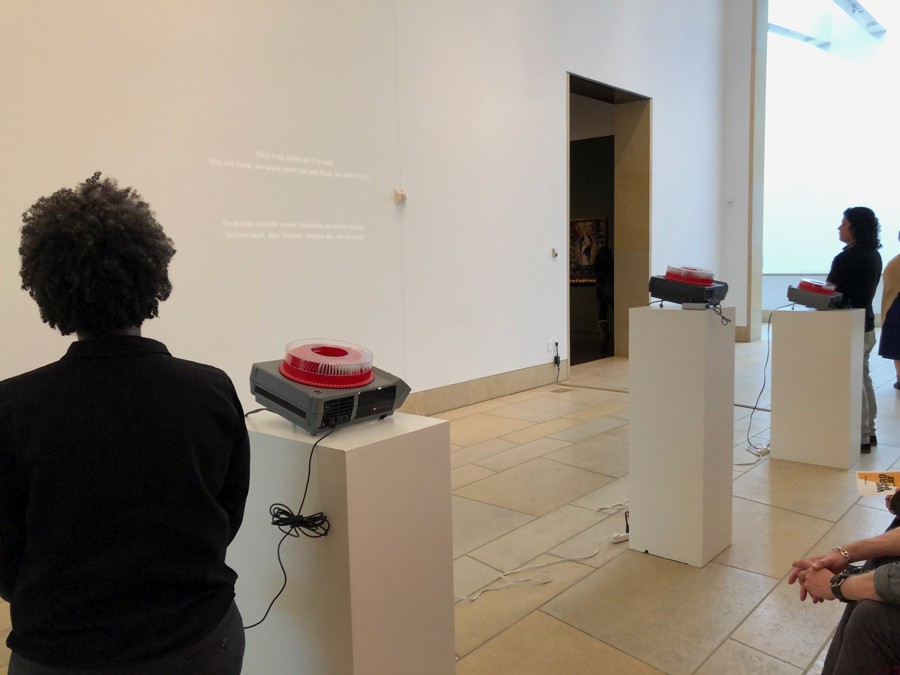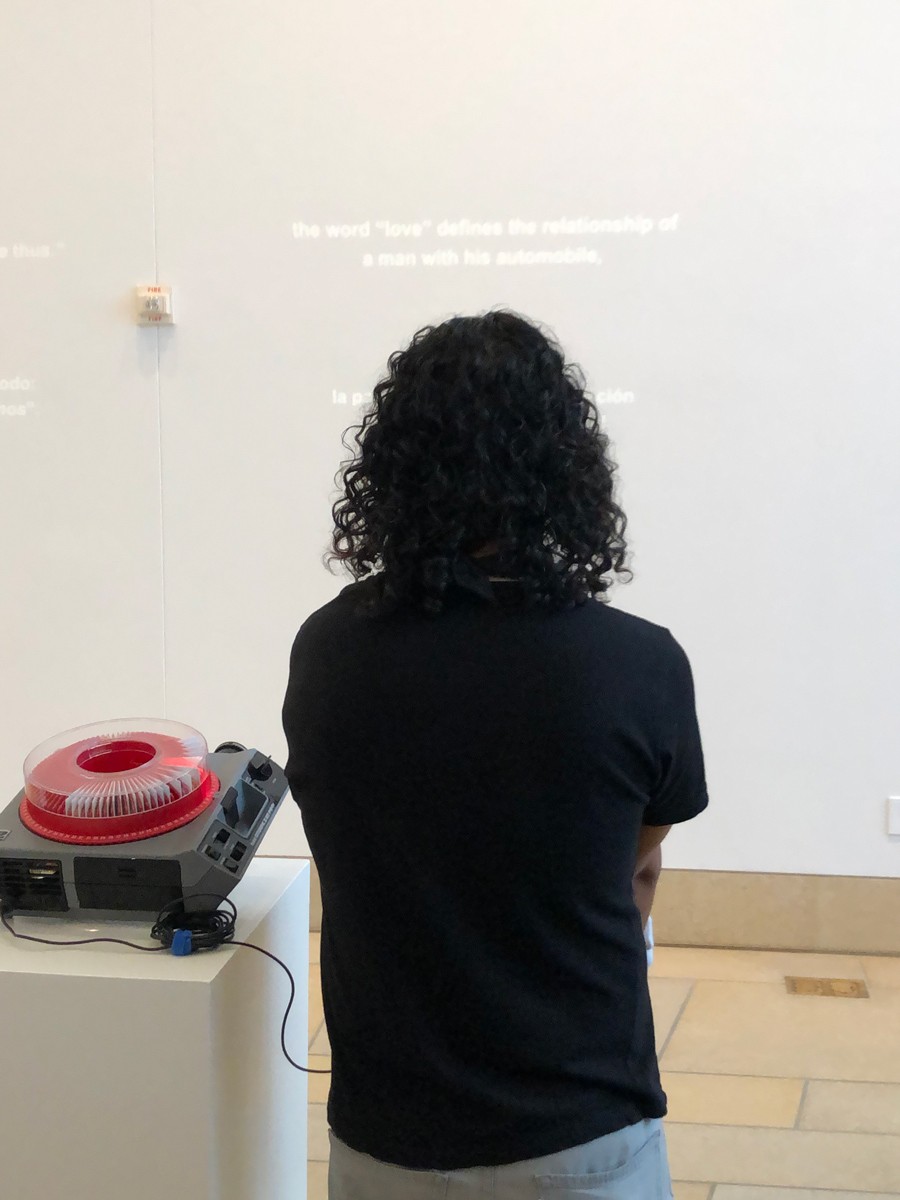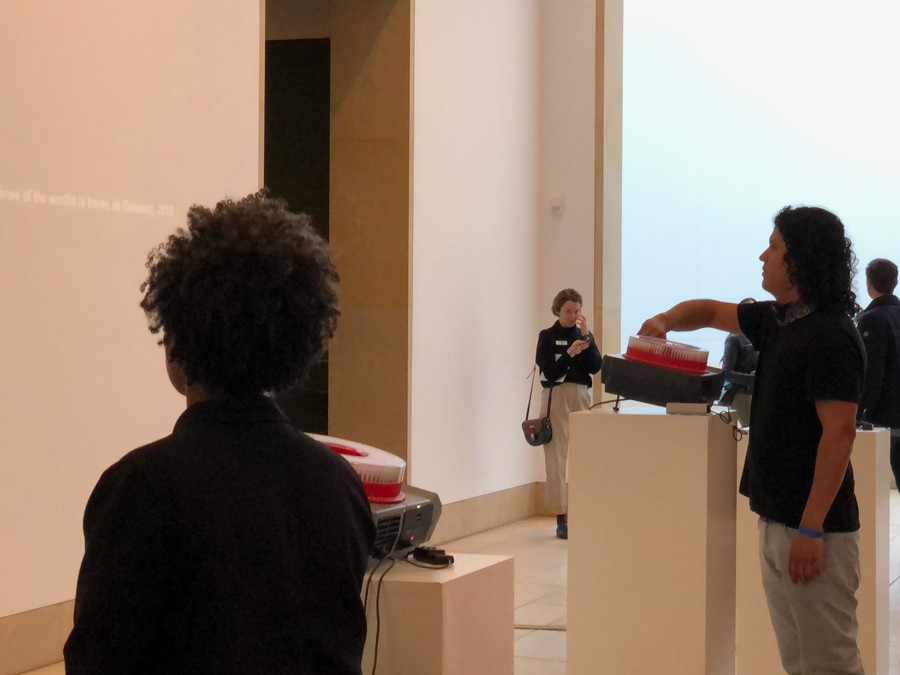© 2006 - 2024 Adrian Aguilera
Built with Indexhibit
in defense of the wor(l)d (a través de Galeano)
SoundSpace: Word/Play
Blanton Museum of Art at the University of Texas
February 2019
Pulling from histories, literatures, and diasporic time travel, Adrian Aguilera and Betelhem Makonnen create works informed by an immigrant’s perspective of constant translations within multiple realities. Their projects operate on relationality -– prioritizing inter/intra-connections, both spatial and temporal, between the work, the audience and the environment.
"History never really says goodbye, history says, see you later." Eduardo Galeano
Bringing to light a 1978 text by the radical Latin American journalist/poet/thinker Eduardo Galeano, written in a context of dictatorship, censorship, and wanton abuse of Indigenous peoples, in defense of the wor(l)d (a través de Galeano) visualizes his still relevant call for a different wor(l)d, a wor(l)d deserving to be what the wor(l)d wanted to be when it was a different wor(l)d, a wor(l)d deserving to be what the wor(l)d wanted to be when it was not yet born.
Artwork
Adrian Aguilera and Betelhem Makonnen
in defense of the wor(l)d (a través de Galeano), 2019
performance piece for three 35mm slides projectors
Links
https://blantonmuseum.org
I believe in my vocation; I believe in my instrument.
Creo en mi oficio; creo en mi instrumento.
I cannot understand why those writers write who declare airily
Nunca pude entender por qué escriben los escritores que mientras tanto declaran, tan campantes,
that writing makes no sense in a world where people are dying of hunger.
que escribir no tiene sentido en un mundo donde la gente muere de hambre.
Nor can I understand those who convert the word into the target of their rage and into a fetish.
Tampoco pude nunca entender a los que convierten a la palabra en blanco de furias o en objeto de fetichismo.
Words are weapons, and they can be used for good or for evil; the crime can never be blamed on the knife.
La palabra es un arma, y puede ser usada para bien o para mal: la culpa del crimen nunca es del cuchillo.
I think that a primordial function of Latin American literature today is the rescue of the word,
Creo que una función primordial de la literatura latinoamericana actual consiste en rescatar la palabra,
frequently used and abused with impunity for the purpose of hampering and betraying communication.
usada y abusada con impunidad y frecuencia para impedir o traicionar la comunicación.
“Freedom” in my country is the name of a jail for political prisoners,
“Libertad” es, en mi país, el nombre de una cárcel para presos políticos
and “democracy” forms part of the title of various regimes of terror;
y “Democracia” se llaman varios regímenes de terror;
the word “love” defines the relationship of a man with his automobile,
la palabra “amor” define la relación del hombre con su automóvil
and “revolution” is understood to describe what a new detergent can do in your kitchen;
y por “revolución” se entiende lo que un nuevo detergente puede hacer en su cocina;
“glory” is something that a certain smooth soap produces in its user,
la “gloria” es algo que produce un jabón suave de determinada marca
and “happiness” is a sensation experienced while eating hot dogs.
y la “felicidad” una sensación que da comer salchichas.
“A peaceful country” means, in many countries of Latin America, “a well-kept cemetery,”
“País en paz” significa, en muchos lugares de América Latina, “cementerio en orden”,
and sometimes “healthy man” must be read as “impotent man.”
y donde dice “hombre sano” habría que leer a veces “hombre impotente”.
By writing it is possible to offer, in spite of persecution and censorship,
Escribiendo es posible ofrecer, a pesar de la persecución y la censura,
the testimony of our time and our people—for now and for later.
el testimonio de nuestro tiempo y nuestra gente – para ahora y después -.
One may write as if to say: “We are here, we were here; we are thus, we were thus.”
Se puede escribir como diciendo, en cierto modo: “Estamos aquí, aquí estuvimos; somos así, así fuimos”.
In Latin America a literature is taking shape and acquiring strength,
Lentamente va cobrando fuerza y forma, en América Latina,
a literature that does not lull its readers to sleep,
una literatura que no ayuda a los demás a dormir,
but rather awakens them; that does not propose to bury our dead,
sino que les quita el sueño; que no se propone enterrar a nuestros muertos,
but to immortalize them; that refuses to stir the ashes but rather attempts to light the fire.
sino perpetuarlos; que se niega a barrer las cenizas y procura, en cambio, encender el fuego.
This literature perpetuates and enriches a powerful tradition of combative words.
Esa literatura continúa y enriquece una formidable tradición de palabras peleadoras.
If, as we believe, hope is preferable to nostalgia,
Si es mejor, como creemos, la esperanza que la nostalgia,
perhaps that nascent literature may come to deserve the beauty of the social forces which,
quizás esa literatura naciente pueda llegar a merecer la belleza de las fuerzas sociales que tarde o temprano,
sooner or later, by hook or by crook, will radically alter the course of our history.
por las buenas o por las malas, cambiarán radicalmente el curso de nuestra historia.
And perhaps it may help to preserve for the generations to come—
Y quizás ayude a guardar para los jóvenes—
—in the words of the poet—“the true name of all things.”
—En palabras del poeta— “el verdadero nombre de todas las cosas”.
One may write as if to say: “We are here, we were here; we are thus, we were thus.”
Se puede escribir como diciendo, en cierto modo: “Estamos aquí, aquí estuvimos; somos así, así fuimos”.
One may write as if to say: “We are here, we were here; we are thus, we were thus.”
Se puede escribir como diciendo, en cierto modo: “Estamos aquí, aquí estuvimos; somos así, así fuimos”.
One may write as if to say: “We are here, we were here; we are thus, we were thus.”
Se puede escribir como diciendo, en cierto modo: “Estamos aquí, aquí estuvimos; somos así, así fuimos”.
One may write as if to say: “We are here, we were here; we are thus, we were thus.”
Se puede escribir como diciendo, en cierto modo: “Estamos aquí, aquí estuvimos; somos así, así fuimos”.
